
July 7, 2022
11 min read
Provectus at Amazon re:MARS 2022: Breakout Session with PepsiCo, AWS DeepRacer Win, and a Quick Trip to the Future
Author:
Provectus, AI-first consultancy and solutions provider.
Greetings from Amazon re:MARS 2022!
It has been three years since the last MARS conference in 2019, but Las Vegas has not changed: it is baking hot outside, casinos beckon you from every sidewalk, and tech folks from all over the world are talking about AI, robots, and space.
Provectus is proud to have participated in Amazon re:MARS 2022. As a gold sponsor, we brought the heat — our best tech minds — to the event, to deliver a joint breakout session with PepsiCo. We proudly won second place in AWS DeepRacer, entertained guests at our booth with a funny and smart computer vision demo, and most importantly, explored the horizons of Machine learning, Automation, Robotics, and Space.
Let’s take a quick trip to MARS!
A Truly Futuristic Experience
Amazon re:MARS is not just a conference, it is an experience. Walking through the expo halls, you may encounter a prototype of Blue Origin’s latest space capsule, interact with all types of robots and intelligent machines, and view exhibits of drones and other airborne devices.
And of course there were robots galore: a household robot named Amazon Astro; a fully autonomous warehouse robot called Proteus; a Play-Doh forming hand robot called RoboCraft; several light-emitting, insect-scale robots developed by MIT; and deep-water mining robots by Impossible Mining. As usual, various robot dogs created by Boston Dynamics were casually strolling around the expo.
The Provectus team had its own booth, and we did our best to add to the fun!
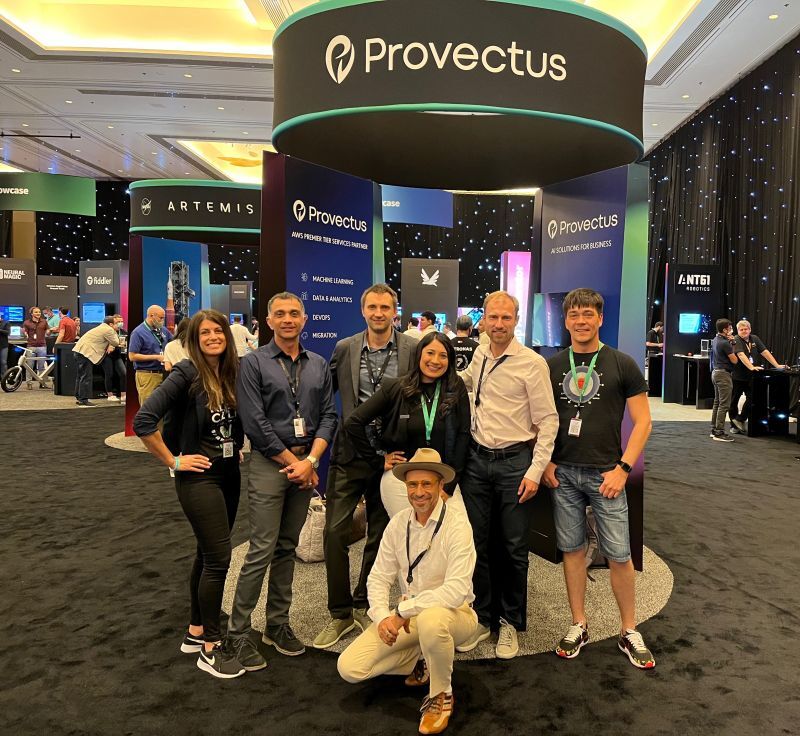
Every attendee could take part in our simple but entertaining Computer Vision demo. Booth visitors could take a photo of their face and have it processed by the ML model to animate it in fun ways – adding Einstein hair, going bald, elongating features, and more. Long story short, anyone could play with the settings to create a fun, AI-generated photo.
We also had a couple of quizzes and contests at the booth, and the winners received valuable prizes from Provectus. For example, one winner of our tech quiz got a programmable AI/Ml-powered robot — he was extra excited about that!
The Provectus team did more than man the booth, though. We hosted an AWSome Happy Hour for our clients and partners at Top Golf. Our sales manager Tera Tarbet won a virtual run for Obliteride and got to meet such AWS stars as Jeff Barr. Our brainiacs, Rinat Gareev and Leonid Blokhin, competed in the AWS DeepRacer League and came in second place after the NASA team.

Overall, Amazon re:MARS 2022 did not disappoint. There were three inspiring keynotes, multiple thought-provoking leadership and breakout sessions, and tons of networking with the world’s greatest minds, like Michio Kaku.
Provectus did not disappoint either. Together with PepsiCo’s eCommerce Retail Data Engineering Lead Russell Lamb, Provectus’s Cofounder, CEO/CTO Stepan Pushkarev delivered a breakout session on the data and ML business transformation undertaken by PepsiCo with the help of Provectus.
Stepan and Russell also gave a joint interview on the topic.
Overall it was a great experience that also rendered tons of value. Let’s explore Keynote 1, Keynote 2, and Keynote 3 in more detail, starting with the topics that interest us most — data, AI, and ML.
AI, Data, and Machine Learning
At Provectus, we work hard to empower businesses through artificial intelligence, machine learning and data, so talks covering our areas of expertise were our main interest and priority at re:MARS.
Swami Sivasubramanian, VP of Data and ML Services at AWS, led the pack. His talk was about pushing the ML space forward, with focus on three major areas: Natural Language Processing, Graph Neural Networks, and Automated Machine Learning.

AWS NLP services can be applied and used in various scenarios. For example, Amazon Kendra revolutionizes unified search; Amazon QuickSight Q takes plain language data queries to another level; Amazon Connect provides businesses with a highly efficient intelligent contact center.
The applications of NLP do not end with business use cases. NLP can also be helpful to developers for tackling undifferentiated heavy lifting.
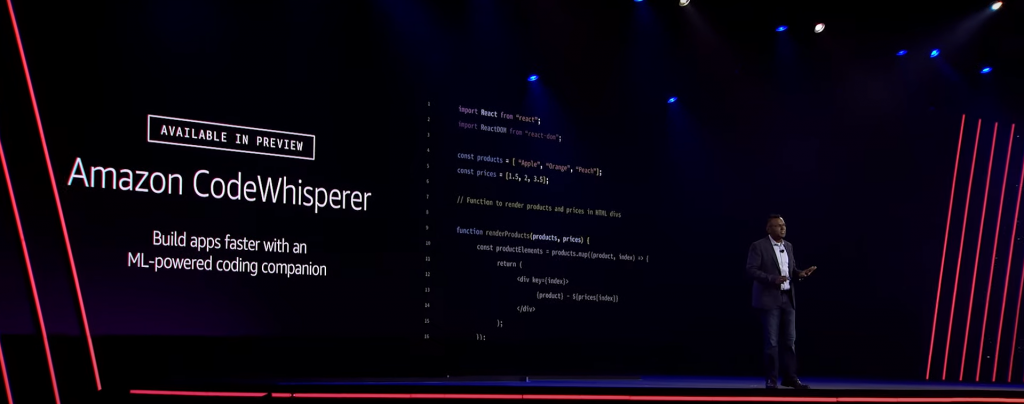
Amazon CodeWhisperer is an ML-powered service that improves developer productivity by generating code recommendations, based on their comments in natural language and code in the IDE. This service could become the ultimate coding companion for all developers.
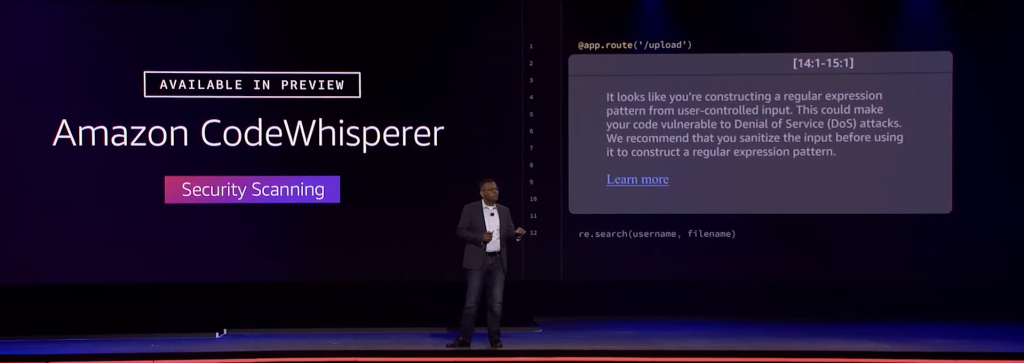
Amazon CodeWhisperer comes with built-in features, such as security scanning, reference tracking, and bias avoidance. These all help AWS to provide developers with services based on the Responsible AI principles.
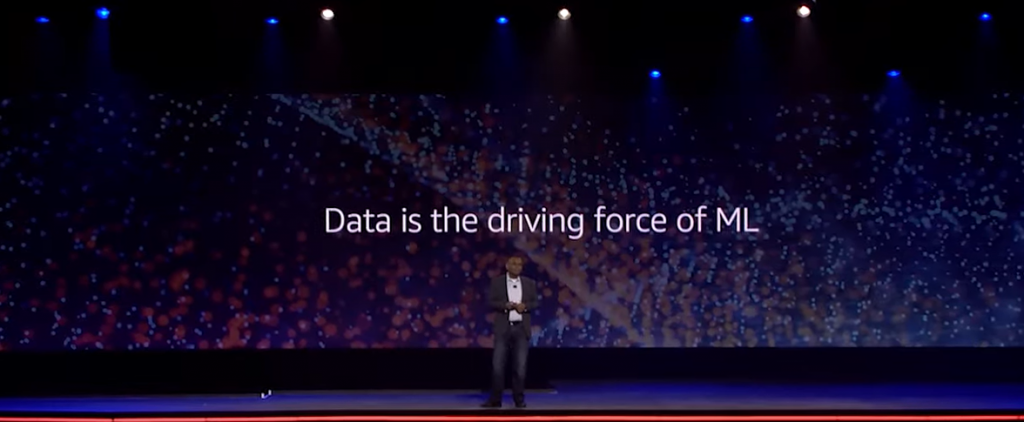
Data is the driving force of ML, but it is complex and nuanced. It does not exist in vacuum, but rather in dozens of thousands of interconnected events. In order for ML to progress, more advanced methods of handling interconnected datasets are needed.
Graph Neural Networks (GNNs) are the next big thing. They allow to apply machine learning methods to graphs. GNNs already power such AWS services as Amazon Personalize and Amazon Fraud Detector. Graphs and GNNs can be hard to tackle, but AWS has data and ML professionals covered with Amazon Neptune ML and Deep Graph Library.
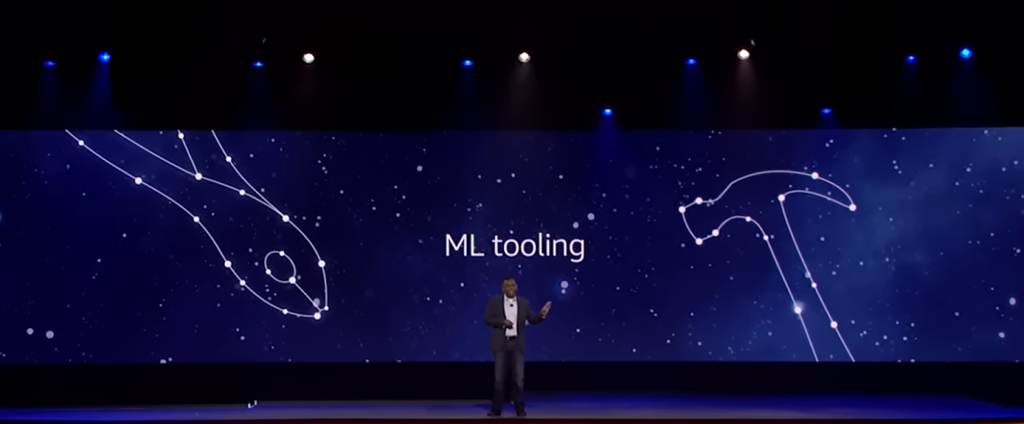
No matter the data type, having the right ML tools to build, train, and deploy ML models plays a crucial role in solving specific business problems. Open-source frameworks are a vital part of the toolset.
AutoGluon is a great example of such ML tools. It is a framework for enabling easy-to-use and easy-to-extend AutoML that, thanks to AWS, is available out-of-the-box in Amazon SageMaker. AutoGluon helps engineers to handle feature engineering, model selection, and hyper parameter optimization with only three lines of code.
Speaking of code, that is not what drives robotics today. Data and ML do.
Advanced perception systems that power the brains of robots are becoming more useful and convenient by operating at the edge and in the cloud. Great examples of such systems are the robots used in Amazon’s fulfillment centers, or the Boston Dynamics robots.
The training of advanced perception systems is difficult, because dozens of thousands of data points are needed to ensure their accuracy in various landscapes and scenarios. As a rule, gaining access to such databases is impossible, or they may not exist at all. The answer to this problem is synthetic data.
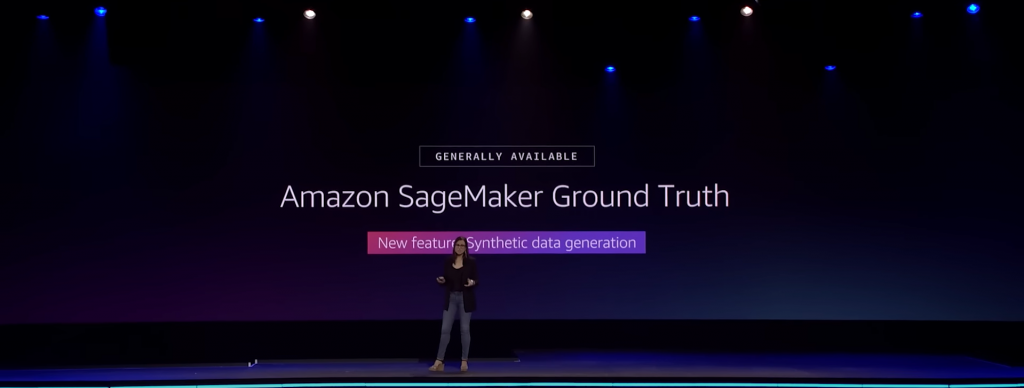
Synthetic data generation is a new feature of Amazon SageMaker Ground Truth that enables data engineers to generate labeled synthetic image data. Synthetic data gives them the freedom to create any imaginary environment, including edge cases that may be difficult to find and replicate in real-world data.
Intelligent systems like robots need real-world data to be able to collect and process at scale. This is a challenge, yet with the advance of the cloud and edge computing (e.g. AWS Snowcone) the humanity has gotten closer to resolving it.
Simulation can also be a solution. For example, to teach a robot to drive, you would have to drive millions of miles, which is not realistic. Aurora, an American self-driving vehicle technology company, simulates dozens of thousands of driving scenarios for their vehicles, to ensure that the models are properly trained for the real world. Industrial robots can be trained on the same principle.
Amazon has released such services as AWS RoboMaker WorldForge, AWS IoT RoboRunner, and AWS IoT TwinMaker to unlock the potential of simulation.
By combining all types of data (real-world, synthetical, simulated, etc.) with AI/ML technology (from Computer Vision to GNNs), Amazon strives to expand the frontiers of innovation for all.
Robots, Space, and New Frontiers of Innovation
Amazon is known for its fantastic yet reasonable vision of the future. Here is a quick recap of other news and updates from Amazon re:MARS that will give you a sneak peek into the not-too-distant future.
At-scale space tourism by the turn of the decade. Amazon and Blue Origin are planning to unlock the future of humanity. As the cost of space access continues to go down, we can expect to see more people exploring, exploiting, and experiencing outer space. To help them on this journey, Blue Origin plans to build Orbital Reef, a convenient space hotel, by the end of 2030.
Quantum revolution is just around the corner. Quantum computers operate by using the laws of physics (quantum superposition, quantum entanglement, landscape of probabilities), and can be used to hack any modern encryption system. The solution is to apply quantum security to fight quantum hacking. Quantum research also opens up new possibilities, from quantum internet (teleportation of quantum information) to better computers for all kinds of tasks.
AI generates insights about the world in real time. Today, problems on Earth are just too big for the human eye. New advances in AI, Data Science, and IoT can help us visualize what we cannot see. Orbital Insight augments human insight and intelligence with AI to solve problems on a global scale. Their work is crucial for decision makers, and can be applied in such use cases as port activity analysis, land use changes, marine vessel tracking, supply chain traceability, supply disruption, demand forecasting, and environmental sustainability.
Cars could become fully driverless in a few years. The mission of Zoox is to reinvent personal transportation by making the future safer, cleaner, and more enjoyable for everyone. Since 2019, the company has made amazing progress, with the first purpose-built, autonomous driving car already cruising the streets of San Francisco. The Zoox vehicle is revolutionary because it is designed for sensors, optimal data collection, and surrounding perception. Sensor fusion — a combination of cameras, lidars, radars, and thermal sensors — enables Zoox to efficiently integrate hardware and software to achieve vehicle autonomy on the road.
Islands of automation will dominate Amazon warehouses. Amazon is known for its revolutionary approach to warehousing operations, and Amazon Robotics has been a driving force of this transformation for 10 years. The company plans to make its warehouses even more robot-oriented with “islands of automation” — pockets of smart robots that make the work of humans easier and more efficient. To accelerate the transition for all, Amazon has launched the Amazon Industrial Innovation Fund.
Physical retail will operate based on the “grab and go” principle. Amazon continues to reinvent physical retail. Amazon Go, Amazon One, Amazon Dash Cart, and Amazon Style are already changing the way people shop and buy. To make these innovations possible, Amazon had to solve many different problems involving the process of buying, vibrations in stores, data collection with cameras, and better design of physical space. Now, every customer can simply grab whatever they want and leave the premises — AI will do the rest.
Ambient intelligence is getting more advanced with Amazon Alexa. Generalizable intelligence (not to be confused with AGI) already powers Amazon Alexa, enabling it to handle routine interactions and engage in human-like conversation. The device is on track to become smarter in upcoming iterations, with new multi-task, multi-lingual, and multi-modal features. Alexa’s AI thinks before it speaks, literally.
Humans are returning to the Moon. Next stop — Mars. The first commercial lunar contract is signed. Lunar Outpost will bring NASA astronauts to the Moon next year. Then, the satellite will be used as a gateway to Mars, a testing ground for self-assembling space structures and other devices (mainly, robots) that can help humans to conquer the Red Planet. The MIT Space Exploration Initiative is now engaged in training the space generation on Earth.
Brain computer interfaces become a reality. Tweeting with your thoughts may not sound like the best idea, yet for the disabled, using a brain computer interface (BCI) connected to Twitter may be the only way to communicate. Technology is a fundamental human right, and Synchron, a company developing an endovascular BCI, is working hard to ensure that everyone can access it. The company is driving a neurological renaissance, with the first patients already tweeting and communicating, using just their thoughts. The use of the BCI technology is expected to scale massively in the next 20-30 years.
The commercialization of space is going to accelerate and intensify. The answer to a faster, more efficient exploration of space lies in its exploitation. Space tourism, mining of useful materials, and scientific discovery are all incentives to move forward. Justin Cyrus, CEO of Lunar Outpost, believes that robots can be our best friends on this journey. His company designs and develops various types of robots for different tasks (e.g. MAPP), and will handle the first commercial lunar contract in 2023, with further missions to other parts of the solar system in progress. Eventually, the company hopes to end scarcity on Earth through better access to the vast resources of space.
Human flight is a reality. Richard Browning, Founder and Chief Test Pilot for Gravity Industries, has spent a decade developing the Jet Suit, a modern jet pack that uses miniature jet engines to achieve vertical flight. The device can easily propel the wearer through the air, and can be used in various scenarios, from medics flying uphill to help an injured person, to military personnel boarding a vessel in minutes instead of hours.
The Future Is on the Horizon
Provectus participated in one of the first re:MARS conferences back in 2019. Since then, many of the innovations that were unveiled there have become a reality. AI/ML technology as a whole has made a giant leap forward. Robots have become smarter and much more autonomous. Self-driving cars are a part of everyday life, and the concept of mass-scale space travel is no longer limited to sci-fi books and movies.
Provectus is excited to be a part of the movement towards a technology-driven future. We believe that AI holds massive potential to make our world a better place to live and thrive for every human. Let’s work together to make it a reality!


.png)